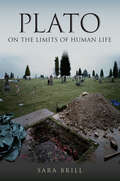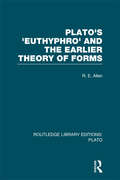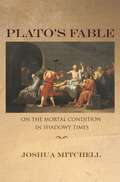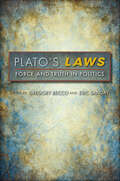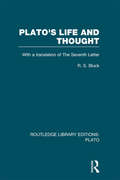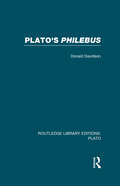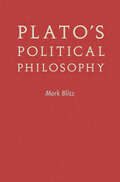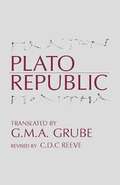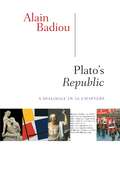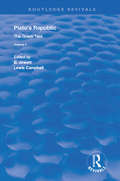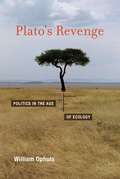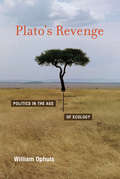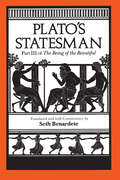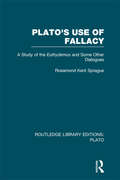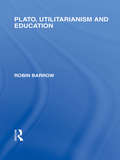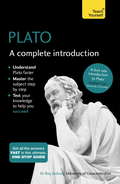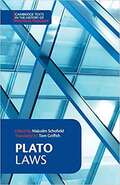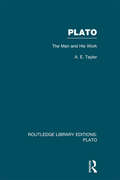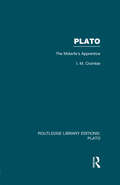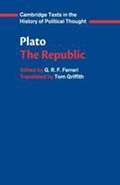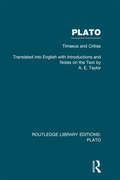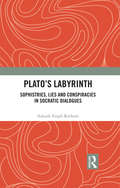- Table View
- List View
Plato on the Limits of Human Life (Studies in Continental Thought)
by Sara Brill“A book that is an ambitious, well-researched and provocative scholarly reflection on soul in the Platonic corpus.” —PolisBy focusing on the immortal character of the soul in key Platonic dialogues, Sara Brill shows how Plato thought of the soul as remarkably flexible, complex, and indicative of the inner workings of political life and institutions. As she explores the character of the soul, Brill reveals the corrective function that law and myth serve. If the soul is limitless, she claims, then the city must serve a regulatory or prosthetic function and prop up good political institutions against the threat of the soul’s excess. Brill’s sensitivity to dramatic elements and discursive strategies in Plato’s dialogues illuminates the intimate connection between city and soul.“Sara Brill takes on at least two significant issues in Platonic scholarship: the nature of the soul, and especially the language of immortality in its description, and the relationship between politics and psychology. She treats each one of these topics in a fresh and nuanced way. Her writing is beautiful and fluid.” —Marina McCoy, Boston College
Plato'S Republic
by Mark L. McpherranPlato's Republic has proven to be of astounding influence and importance. Justly celebrated as Plato's central text, it brings together all of his prior works, unifying them into a comprehensive vision that is at once theological, philosophical, political, and moral. These essays provide a state-of-the-art research picture of the most interesting aspects of the Republic, and address questions that continue to puzzle and provoke, such as: Does Plato succeed in his argument that the life of justice is the most attractive one? Is his tripartite analysis of the soul coherent and plausible? Why does Plato seem to have to force his philosopher-guardians to rule when they know this is something that they ought to do? What is the point of the strange and complicated closing Myth of Er? This volume will be essential to those looking for thoughtful and detailed excursions into the problems posed by Plato's text and ideas.
Plato's Euthyphro and the Earlier Theory of Forms: A Re-Interpretation of the Republic (Routledge Library Editions: Plato)
by R E AllenPlato’s Euthyphro is important because it gives an excellent example of Socratic dialogue in operation and of the connection of that dialectic with Plato’s earlier theory of Forms. Professor Allen’s edition of the dialogue provides a translation with interspersed commentary, aimed both at helping the reader who does not have Greek and also elucidating the discussion of the earlier Theory of Forms which follows. The author argues that there is a theory of Forms in the Euthyphro and in other early Platonic dialogues and that this theory is the foundation of Socratic dialogue. However, he maintains that the theory in the early dialogues is a realist theory of universals and this theory is not to be identified with the theory of Forms found in the Phaedo, Republic, and other middle dialogues, since it differs on the issues of ontological status.
Plato's Fable: On the Mortal Condition in Shadowy Times (New Forum Books #40)
by Joshua MitchellThis book is an exploration of Plato's Republic that bypasses arcane scholarly debates. Plato's Fable provides refreshing insight into what, in Plato's view, is the central problem of life: the mortal propensity to adopt defective ways of answering the question of how to live well. How, in light of these tendencies, can humankind be saved? Joshua Mitchell discusses the question in unprecedented depth by examining one of the great books of Western civilization. He draws us beyond the ancients/moderns debate, and beyond the notion that Plato's Republic is best understood as shedding light on the promise of discursive democracy. Instead, Mitchell argues, the question that ought to preoccupy us today is neither "reason" nor "discourse," but rather "imitation." To what extent is man first and foremost an "imitative" being? This, Mitchell asserts, is the subtext of the great political and foreign policy debates of our times. Plato's Fable is not simply a work of textual exegesis. It is an attempt to move debates within political theory beyond their current location. Mitchell recovers insights about the depth of the problem of mortal imitation from Plato's magnificent work, and seeks to explicate the meaning of Plato's central claim--that "only philosophy can save us."
Plato's Laws: Force and Truth in Politics (Studies in Continental Thought)
by Gregory Recco and Eric SandayReaders of Plato have often neglected the Laws because of its length and density. In this set of interpretive essays, notable scholars of the Laws from the fields of classics, history, philosophy, and political science offer a collective close reading of the dialogue "book by book" and reflect on the work as a whole. In their introduction, editors Gregory Recco and Eric Sanday explore the connections among the essays and the dramatic and productive exchanges between the contributors. This volume fills a major gap in studies on Plato's dialogues by addressing the cultural and historical context of the Laws and highlighting their importance to contemporary scholarship.
Plato's Life and Thought: With a Translation of the Seventh Letter (Routledge Library Editions: Plato)
by R S BluckR. S. Bluck’s engaging volume provides an accessible introduction to the thought of Plato. In the first part of the book the author provides an account of the life of the philosopher, from Plato’s early years, through to the Academy, the first visit to Dionysius and the third visit to Syracuse, and finishing with an account of his final years. In the second part contains a discussion of the main purpose and points of interest of each of Plato’s works. There is a chapter on Plato’s central doctrine, the Theory of Ideas, and a translation of Plato’s Seventh Letter, which not only provides valuable additional material for the study of Plato’s thought but also contains a vivid account of many incidents in Plato’s life.
Plato's Philebus: Plato: Plato's Philebus (Routledge Library Editions: Plato)
by Donald DavidsonThe Philebus is hard to reconcile with standard interpretations of Plato’s philosophy and in this pioneering work Donald Davidson, seeks to take the Philebus at face value and to reassess Plato’s late philosophy in the light of the results. The author maintains that the approach to ethics in the Philebus represents a considerable return to the methodology of the earlier dialogues. He emphasizes Plato’s reversion to the Socratic elenchus and connects it with the startling reappearance of Socrates as the leading voice in the Philebus.
Plato's Political Philosophy
by Mark BlitzThis comprehensive, yet compact, introduction examines Plato's understanding of law, justice, virtue, and the connection between politics and philosophy.Focusing on three of Plato's dialogues—The Laws, The Republic, and The Statesman—Mark Blitz lays out the philosopher's principal interests in government and the strength and limit of the law, the connection between law and piety, the importance of founding, and the status and limits of political knowledge. He examines all of Plato's discussions of politics and virtues, comments on specific dialogues, and discusses the philosopher's explorations of beauty, pleasure, good, and the relations between politics and reason. Throughout, Blitz reinforces Plato's emphasis on clear and rigorous reasoning in ethics and political life and explains in straightforward language the valuable lessons one can draw from examining Plato's writings.The only introduction to Plato that both gathers his separate discussions of politically relevant topics and pays close attention to the context and structure of his dialogues, this volume directly contrasts the modern view of politics with that of the ancient master. It is an excellent companion to Plato's Dialogues.
Plato's Republic (Second Edition)
by G. M. A. Grube C. D. C. ReevePlato's famous musings about how society should function. The second edition of this translation.
Plato's Republic: A Dialogue in Sixteen Chapters (Gender And Culture)
by Alain BadiouPlato's Republic is one of the best-known and most widely-discussed texts in the history of philosophy. But how might we get to the heart of this work today, 2,500 years after its original composition? Alain Badiou breathes life into Plato's landmark text and revives its universality. Rather than producing yet another critical commentary, he has instead worked closely on the original Greek and, through spectacular changes, adapted it to our times. In this innovative reimagining of Plato's work, Badiou has removed all references specific to ancient Greek society—from lengthy exchanges about moral courage in archaic poetry to political considerations mainly of interest to the aristocratic elite—and has expanded the range of cultural references. Here, philosophy is firing on all cylinders: Socrates and his companions are joined by Beckett, Pessoa, Freud, and Hegel, among others. Together these thinkers demonstrate that true philosophy endures, ready to absorb new horizons without changing its essence.Moreover, Badiou—who is also a dramatist—has transformed the Socratic dialogue into a genuine oratorial contest. In his version of the Republic, the interlocutors do much more than simply agree with Socrates. They argue, stand up to him, put him on the spot, and show thought in motion. In this work of dramatic scholarship and philosophy, we encounter a modern version of Plato's text that is alive, stimulating, and directly relevant to our own world.
Plato's Republic: The Greek Text (Routledge Revivals)
by B. JOWETT AND LEWIS CAMPBELLFirst published in 1894, this book consists of essays by professors Jowett and Campbell about the classic Greek philosopher Plato, and his famous and widely read dialogue The Republic, which is considered one the world’s most influential works. Plato is believed to be the pivotal figure in the development of Western philosophy, and the editors explore this throughout the book along with relations to other Greek dialogues and authors.
Plato's Revenge
by William OphulsIn this provocative call for a new ecological politics, William Ophuls starts from a radical premise: "sustainability" is impossible. We are on an industrial Titanic, fueled by rapidly depleting stocks of fossil hydrocarbons. Making the deck chairs from recyclable materials and feeding the boilers with biofuels is futile. In the end, the ship is doomed by the laws of thermodynamics and by the implacable biological and geological limits that are already beginning to pinch. Ophuls warns us that we are headed for a postindustrial future that, however technologically sophisticated, will resemble the preindustrial past in many important respects. With Plato's Revenge, Ophuls, author of Ecology and the Politics of Scarcity, envisions political and social transformations that will lead to a new natural-law politics based on the realities of ecology, physics, and psychology. Conventional environmental politics tries to treat the most glaring symptoms of ecological illness while ignoring the anti-ecological dynamic that created them. Ophuls returns to first principles, relying on time-tested classical authors--Plato, Rousseau, Jefferson, Thoreau, and others who have grappled with the fundamental issues of politics. He invites readers to question their most basic social, economic, political, and even moral assumptions, as the first step toward imagining a truly ecological future. In a discussion that ranges widely--from ecology to quantum physics to Jungian psychology to Eastern religion to Western political philosophy--Ophuls argues for an essentially Platonic politics of consciousness dedicated to inner cultivation rather than outward expansion and the pursuit of perpetual growth. We would then achieve a way of life that is materially and institutionally simple but culturally and spiritually rich, one in which humanity flourishes in harmony with nature.
Plato's Revenge: Politics in the Age of Ecology
by William OphulsA provocative essay that imagines a truly ecological future based on political transformation rather than the superficialities of “sustainability.” In this provocative call for a new ecological politics, William Ophuls starts from a radical premise: “sustainability” is impossible. We are on an industrial Titanic, fueled by rapidly depleting stocks of fossil hydrocarbons. Making the deck chairs from recyclable materials and feeding the boilers with biofuels is futile. In the end, the ship is doomed by the laws of thermodynamics and by the implacable biological and geological limits that are already beginning to pinch. Ophuls warns us that we are headed for a postindustrial future that, however technologically sophisticated, will resemble the preindustrial past in many important respects. With Plato's Revenge, Ophuls, author of Ecology and the Politics of Scarcity, envisions political and social transformations that will lead to a new natural-law politics based on the realities of ecology, physics, and psychology.In a discussion that ranges widely—from ecology to quantum physics to Jungian psychology to Eastern religion to Western political philosophy—Ophuls argues for an essentially Platonic politics of consciousness dedicated to inner cultivation rather than outward expansion and the pursuit of perpetual growth. We would then achieve a way of life that is materially and institutionally simple but culturally and spiritually rich, one in which humanity flourishes in harmony with nature.
Plato's Statesman: Part III of The Being of the Beautiful
by PlatoTheaetetus, the Sophist, and the Statesman are a trilogy of Platonic dialogues that show Socrates formulating his conception of philosophy as he prepares the defense for his trial. Originally published together as The Being of the Beautiful, these translations can be read separately or as a trilogy. Each includes an introduction, extensive notes, and comprehensive commentary that examines the trilogy's motifs and relationships. "Seth Benardete is one of the very few contemporary classicists who combine the highest philological competence with a subtlety and taste that approximate that of the ancients. At the same time, he as set himself the entirely modern hermeneutical task of uncovering what the ancients preferred to keep veiled, of making explicit what they indicated, and hence...of showing the naked ugliness of artificial beauty."—Stanley Rose, Graduate Faculty Philosophy Journal Seth Benardete (1930-2001) was professor of classics at New York University. He was the author or translator of many books, most recently The Argument of the Action, Plato's "Laws," and Plato's "Symposium," all published by the University of Chicago Press.
Plato's Use of Fallacy: A Study of the Euthydemus and some Other Dialogues (Routledge Library Editions: Plato)
by Rosamond K SpragueThere are many fallacious arguments in the dialogues of Plato. The author argues that Plato was fully conscious of the fallacious character of at least an important number of these arguments and that he sometimes made deliberate use of fallacy as an indirect means of setting forth certain of his fundamental philosophical views. Plato introduces them, the author maintains, for the purpose of working out their implications. Plato is thus able to expose them for what they are, to clear away possible lines of attack upon his own position, and even to show that when the proper correction is applied his own views receive support.
Plato, Aristotle, and the Purpose of Politics
by Kevin M. CherryIn this book, Kevin M. Cherry compares the views of Plato and Aristotle about the practice, study, and, above all, the purpose of politics. The first scholar to place Aristotle's Politics in sustained dialogue with Plato's Statesman, Cherry argues that Aristotle rejects the view of politics advanced by Plato's Eleatic Stranger, contrasting them on topics such as the proper categorization of regimes, the usefulness and limitations of the rule of law, and the proper understanding of phronēsis. The various differences between their respective political philosophies, however, reflect a more fundamental difference in how they view the relationship of human beings to the natural world around them. Reading the Politics in light of the Statesman sheds new light on Aristotle's political theory and provides a better understanding of Aristotle's criticism of Socrates. Most importantly, it highlights an enduring and important question: Should politics have as its primary purpose the preservation of life, or should it pursue the higher good of living well?
Plato, Utilitarianism and Education (International Library of the Philosophy of Education Volume 3)
by Robin BarrowThree lines of argument are central to this book: that Plato's views as expounded in the Republic indicate that he was a utilitarian; that utilitarianism is the only acceptable ethical theory; that these conclusions have significant repercussions for education. Throughout the book the exposition of utilitarianism and the interpretation of the Republic are closely linked. The author assesses the nature of recent Platonic criticism and provides a critical summary of the Republic. He expounds and defends utilitarianismn and examines in greater depth the consequences for education of accepting a utilitarian position, showing how, for example, from this standpoint such key terms in educational debate as 'autonomy' and 'self-development' must be reassessed as educational objectives.
Plato: A Complete Introduction: Teach Yourself
by Roy JacksonWritten by Dr Roy Jackson, who Senior Lecturer at the University of Gloucestershire, Plato: A Complete Introduction is designed to give you everything you need to succeed, all in one place. It covers the key areas that students are expected to be confident in, outlining the basics in clear jargon-free English, and then providing added-value features like summaries of key books, and even lists of questions you might be asked in your seminar or exam.The book uses a structure that mirrors the way Plato is taught on many university courses, with chapters including: the pre-socratics; Socrates; who was Plato?; can virtue be taught?; piety; the philosophical life; obeying the law of Athens; the Soul; knowledge as recollection; the forms; Plato's state; education and morality; Plato and art; the Later Period; Aristotle, Plato's great pupil; Neoplatonism; Plato and religion; Plato's legacy.
Plato: Laws (Cambridge Texts in the History of Political Thought)
by Tom Griffith Malcolm Schofield PlatóPlato's Laws is one of the most important surviving works of ancient Greek political thought. It offers sustained reflection on the enterprise of legislation, and on its role in the social and religious regulation of society in all its aspects. Many of its ideas were drawn upon by later political thinkers, from Aristotle and Cicero to Thomas More and Montesquieu. <p><p> This book presents the first translation of the complete text of the Laws for thirty-five years, in Tom Griffith's readable and reliable English. Malcolm Schofield, a leading scholar of Greek philosophy, introduces the main themes and characteristics of the work, as well as supplying authoritative notes on the structure and detail of Plato's argument, together with a guide to further reading. The book will be a key resource for those interested in Greek philosophy and of the history of political thought.
Plato: The Man And His Work (Routledge Library Editions: Plato)
by A.E. TaylorThis book provides an introduction to Plato’s work that gives a clear statement of what Plato has to say about the problems of thought and life. In particular, it tells the reader just what Plato says, and makes no attempt to force a system on the Platonic text or to trim Plato’s works to suit contemporary philosophical tastes. The author also gives an account that has historical fidelity - we cannot really understand the Republic or the Gorgias if we forget that the Athens of the conversations is meant to be the Athens of Nicias or Cleon, not the very different Athens of Plato’s own manhood. To understand Plato’s thought we must see it in the right historical perspective.
Plato: The Midwife's Apprentice (Routledge Library Editions: Plato)
by I M CrombieIn Plato’s Theaetetus, Socrates is portrayed as a midwife to the intellect, a metaphor for his task as a dialectician as he seeks to help give birth to wisdom. Thus it is that the author refers to Plato as the midwife’s apprentice. This volume represents an attempt to provide a more manageable account of the author’s two volume magnum opus, An Examination of Plato’s Doctrines. An accessible and lucid introduction to Plato’s ideas is provided which nonetheless challenges traditional interpretations. In particular the author is concerned to offer an interpretation of the significance of what Plato said. The chapters are arranged by topic, for ease of comprehension.
Plato: The Republic
by Tom Griffith G. R. F. FerrariThis is a completely new translation of one of the great works of Western political thought. In addition to Tom Griffith's vivid, dignified and accurate rendition of Plato's text, this edition is suitable for students at all levels. It contains an introduction that assesses the cultural background to the Republic, its place within political philosophy, and its general argument; succinct notes in the text; an analytical summary of content; a full glossary of proper names; a chronology of important events; and a guide to further reading.
Plato: The Republic (Cambridge Texts in the History of Political Thought)
by PlatoPlato's Republic is the first great work of Western political philosophy. This is a completely new translation of one of the great works of Western political thought. It contains an introduction that assesses the cultural background to the Republic, its place within political philosophy, and its general argument; succinct notes in the text; an analytical summary of content; a full glossary of proper names; a chronology of important events; and a guide to further reading. Edited and translated by Tom Griffith, G. R. F. Ferrari
Plato: Timaeus and Critias (Routledge Library Editions: Plato)
by A E TaylorPlato’s Timaeus was his only cosmological dialogue and for almost thirteen hundred years it provided the basis in the West for educated people’s general view of the natural world. The author provides a translation of this important work, together with the Critias – the source of the legendary tale of Atlantis. He has taken particular care to provide an accurate rendering of Plato’s words and to avoid putting his own or any other interpretation on the works.
Plato’s Labyrinth: Sophistries, Lies and Conspiracies in Socratic Dialogues
by Aakash Singh RathoreThis original and stimulating study of Plato's Socratic dialogues rereads and reinterprets Plato's writings in terms of their dialogical or dramatic form. Taking inspiration from the techniques of Umberto Eco, Jacques Derrida, and Leo Strauss, Aakash Singh Rathore presents the Socratic dialogues as labyrinthine texts replete with sophistries and lies that mask behind them important philosophical and political conspiracies. Plato's Labyrinth argues that these conspiracies and intrigues are of manifold kinds – in some, Plato is masterminding the conspiracy; in others, Socrates, or the Sophists, are the victims of the conspiracies. With supplementary forays ('intermissions') into the world of Xenophon and the Sophists, the complex and evolving series of overlapping arguments that the book lays out unfold within an edgy and dramatic narrative. Presenting innovative readings of major texts – Plato's Parmenides, Republic, Symposium and Meno as also Homer's Odyssey – this work is an ambitious attempt to synthesize philological, political, historical and philosophical research into a classical text-centred study that is at once of urgent contemporary relevance. This book aims to revitalize the study of ancient Greek thought in all its diverse disciplinary richness and will interest students and scholars across the social sciences and humanities, especially those in philosophy, Greek and classical studies, language and literature, politics, media and culture studies, theatre and performance studies, and history.
